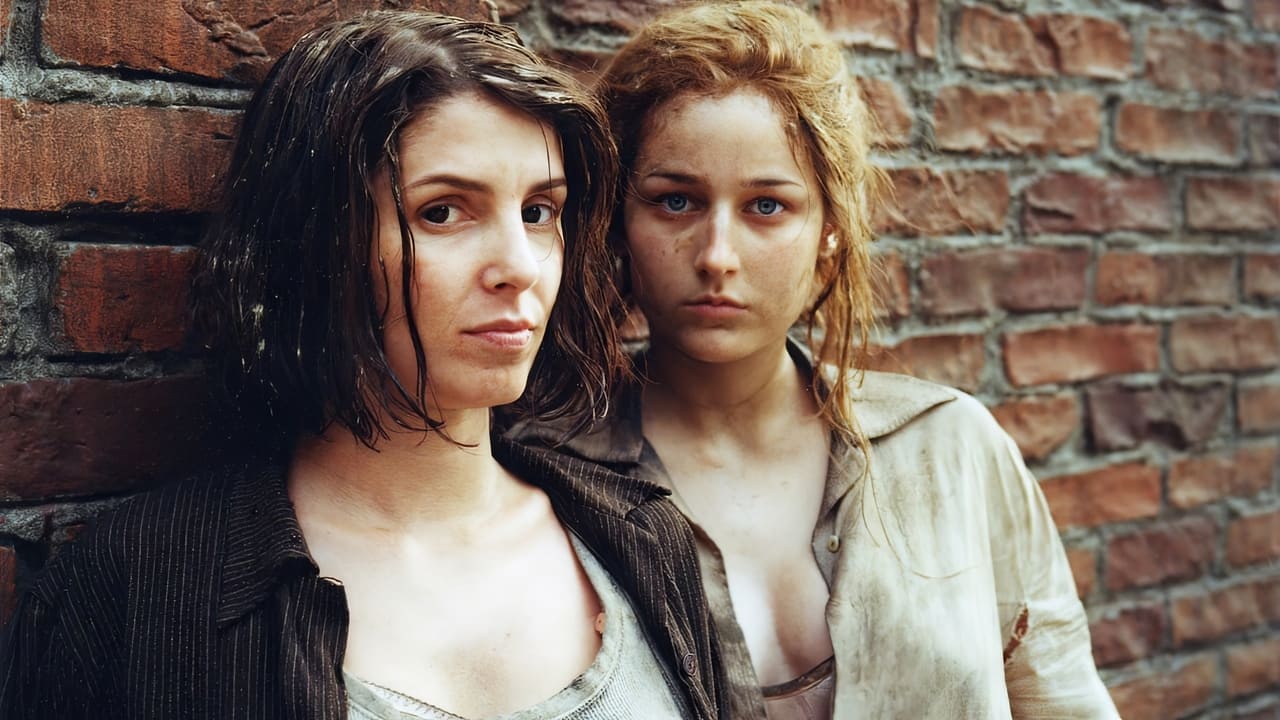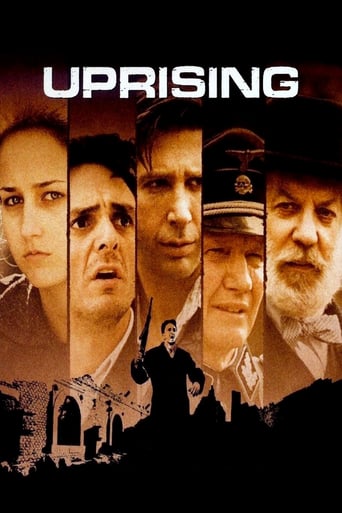


The greatest movie ever!
... View MoreJust perfect...
... View MoreIt's a mild crowd pleaser for people who are exhausted by blockbusters.
... View MoreGreat movie! If you want to be entertained and have a few good laughs, see this movie. The music is also very good,
... View MorePoland surrenders to Germany in 1939. Jews are forced into the Warsaw ghetto. Adam Czerniakow (Donald Sutherland) is the head of the Jewish counsel and Kazik Rotem (Stephen Moyer) is his driver. Tosia Altman (Leelee Sobieski) is able to pass for Aryan and sneaks out to trade for food. Mordechai Anielewicz (Hank Azaria) fails to escape to Palestine and decides to stay for the fight. Yitzhak Zuckerman (David Schwimmer) is his best friend and Zivia Lubetkin (Sadie Frost) is his girlfriend. Calel Wasser is a Jewish policeman in the ghetto. Czerniakow struggles to save lives in the impossible position and Anielewicz berates him for co-operating. As Jews are deported to Treblinka, Czerniakow commits suicide and Anielewicz organizes the resistance. Dr. Fritz Hippler (Cary Elwes) is a German propagandist who made "The Eternal Jew". Major-General Jurgen Stroop (Jon Voight) takes over the operation to clear out the ghetto.This is quite a production for network TV. It's very high quality. There are a couple of questionable scenes where accuracy is concerned. There are some top-notched actors led by the great Donald Sutherland. I could probably do without Schwimmer. Still, it's great for what it is.
... View More....David Schwimer's stating the uprising was longer than the Polish army's resistance to their initial invasion in 1939. If 28 days is the benchmark for the Jewish uprising the Polish resistance went from 1st September through 2nd October 1939 - there was solid combat still in place on the Hel Peninsula.Polish resistance would have exceeded 2nd October had the Russians not invaded prior to that on the 17th September. The Germans were very concerned of the Polish army retreating into the Pripet Marshes for a 'last stand' - Red army units eliminated that possibility.Let me say bluntly it is true there was little cooperation between the gentile Poles and Jewish Poles but there was also, unlike in the Netherlands, France etc., the added penalty of immediate execution if a Pole were found assisting Jews. I am well aware of the exploitation of Jews by Poles as well as the bigotry thrown at the Jews by Poles - even the post-war pogrom in Kielce in 1946. No denial of such. Then again the Red Army's NKVD were disproportionately made up of Jews that came in 1939 - this doesn't mitigate bigotry more a sad commentary on a very very sad time with truly horrific consequences to both Jewish Poles at the hands of the Nazis and gentile Poles at the hands of both the Nazis and Communists.Lastly most photos I have seen on Jurgen Stroop has him wearing that hat/cap used by most officers in the Afrika Korps - the one slightly resembling a baseball cap not the one Voight is shown wearing in the film playing Stroop.
... View MoreOne writer says that the film is historically inaccurate BECAUSE it portrays the Poles falsely. Well, it's not a film about the non-Jewish Poles, it's a film about the Jewish Poles. And while the AK Polish underground organization may have helped the uprising, technical support and so on, the fact is, they weren't in a position to be of much strategic help, simply because of the overwhelming might of the Germany Army of occupation. Remember too, that those Poles who took and active part in the resistance, AK or otherwise, were a very small minority of Poles, just as very few Frenchmen ever fought with the Maquis or other resistance units. That said, I'd be interested to know if the AK, or other Polish groups and let's not forget that the Polish resistance was deeply divided along ideological lines, fighting with itself as well as against the Germans did anything of value to prevent Wermacht units/SS units/ police units from getting to the scene of battle. One suspects they did not, not least because of the high levels of anti-Semitism that existed in Polish society before the war (and again afterward; numbers of concentration camp survivors were murdered in Poland in the aftermath of the German defeat). So the movie is historically accurate in portraying a certain level of anti-Semitism in Polish society. To be absolutely accurate is not possible in a filmed drama, but I would say that the tone of the film, the tone of relations between much of Polish society and Jewish Poland, is generally accurately rendered. It's nice to have a few minor corrections, but they don't change the overall dismal picture of Jewish/Polish relations. Even the great Trilogy indulges itself in a few (moderately) anti-Semitic stereotypes, suggesting that such notions were widely accepted in pre-war Polish society.
... View MoreWWII, and the Holocaust in particular, is a very interesting subject. There has probably never been more interest from the public towards everything that concerns this war, which started already more than 65 years ago. Every week new books, documentaries,... are published with new theories, with evaluations of some important (often Nazi) personalities, with information about the concentration camps,... Because most of the survivors have already died or will die soon, the stories of the last eye-witnesses will get lost if not registered on tape or camera. But all these stories are also a good base for movies and mini-series like this "Uprising"."Uprising" tells the story of the Nazi oppression of the Jews in the Ghetto of Warshaw and their rebellion against it, which started in 1943. It all begins in 1939 with the growing list of prohibitions and regulations leading to the virtual imprisonment of about half-a-million Polish Jews in an old district of Warsaw. Their daily struggle against hunger and disease is made even worse when the Nazis demand for "deportations to the east". Many begin to suspect that the deportation of these groups of laborers are actually camouflaged mass murders and at the end of 1942 they start to realize that they are all doomed. They decide that, if they have to die, they better die in honor by taking up the arms against their oppressors. They start building hidden shelters and bunkers in the basements and cellars of the buildings, often with tunnels leading to other buildings and start collecting arms and ammunition for the battle which will begin on 19 April 1943...Even though I must say that overall I liked the series, I can't say that it was always very convincing. There were a couple too many problems with it that really bothered me. One for instance is the way all the people are depicted. The heroic Jews don't have to expect any help from the arrogant and anti-semitic Polish Catholics who know exactly what is going on, but don't care. The Poles only want to help when offered enormous amounts of money and even then are very reluctant. In reality the Poles also suffered a lot under the German oppression and without their help there would probably never have been a Jewish Uprising. And no, I'm not a Pole myself, so I'm not saying this to justify my people's actions, it's just the way it was.Another thing that I really didn't like was the use of the languages. The Germans speak English most of the time, except for when they are giving some short orders, than you'll hear them talk German. The producers and director have to make a choice, either they all speak German or English, but not a mix of the two. And about the language I also have another remark. Can someone please tell me why those purely American actors, who all know how to speak normal English, speak with that funny, but also incredibly annoying accent? Do they really believe I will not recognize Leelee Sobieski, David Schwimmer,... when they talk in a slightly different way? I'm not asking that they speak Polish, I'm sure they can't, but don't make a fool out of yourself by trying to convince people that you are talking another language, just by adding such an accent, it can never work...Still, even though the series isn't always historically accurate, uses a range of annoying accents and is too stereotypical when it comes to the roles of the different people, not everything about it was that bad. The acting for instance is good. In my opinion this was the best role I've ever seen Leelee Sobieski play and all the other actors did a nice job too. I certainly liked Jon Voight as Major General Jurgen Stroop, but it is Cary Elwes, who played Fritz Hippler (the director of "Der Ewige Jude" or "The Eternal Jew"), who certainly deserves to be mentioned as well.All in all this isn't a bad series. If you try to see it as a drama based on actual events, rather than to see it as a 'documentary reconstruction', than you certainly should be able to enjoy it. There are some nice action scenes, some good acting and other interesting features. You just will have to try to see past some major flaws... I give this series a score between 7/10 and 7.5/10.
... View More